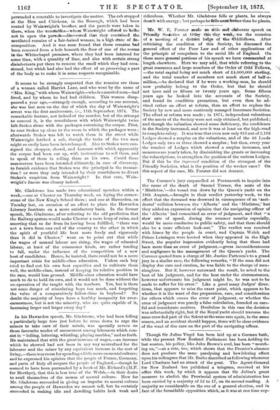The Coroner's jury empanelled at Portsmouth to inquire into the
cause of the death of Samuel Turner, the mate of the
Mistletoe,'—the vessel run down by the Queen's yacht on the 18th August,—brought in their verdict yesterday week, to the effect that the deceased was drowned in consequence of an 'acci- dental' collision between the ' Alberta ' and the 'Mistletoe,' but they added an expression of opinion that the navigating officer of the 'Alberta' had committed an error of judgment, and that "a slow rate of speed, during the summer months especially, would be more conducive to public safety, and that there should also be a more efficient look-out." The verdict was received with hisses by the people in court, and Captain Welch and Prince Leiningen were hooted when they appeared in the High Street, the popular impression evidently being that there bad been more than an error of judgment,—gross inconsiderateness and negligence in the management of the Queen's yacht. The Coroner quoted from a charge of Mr. Justice Patteson's to a grand jury in a similar case, the following remarks, "If the man did not display due care and caution, he was liable to the eharge'of man- slaughter. But if, however untoward the result, he acted to the best of his judgment, and for the best under the circumstances, however unfortunate his judgment might be, he was not to he made to suffer for his error." Like a good many Judges' direc- tions, that appears to miss the exact point, which appears to be whether it is the want of due preparation, care, and consideration for others which causes the error of judgment, or whether the error of judgment was purely a false calculation, founded on care- ful and considerate motives. Doubtless in this case the decision was substantially right, but if the Royal yacht should traverse the same crowded part of the Solent at the same rate again, in the same season, and an accident should happen, there will be clear evidence of the want of due care on the part of the navigating officer.






























 Previous page
Previous page